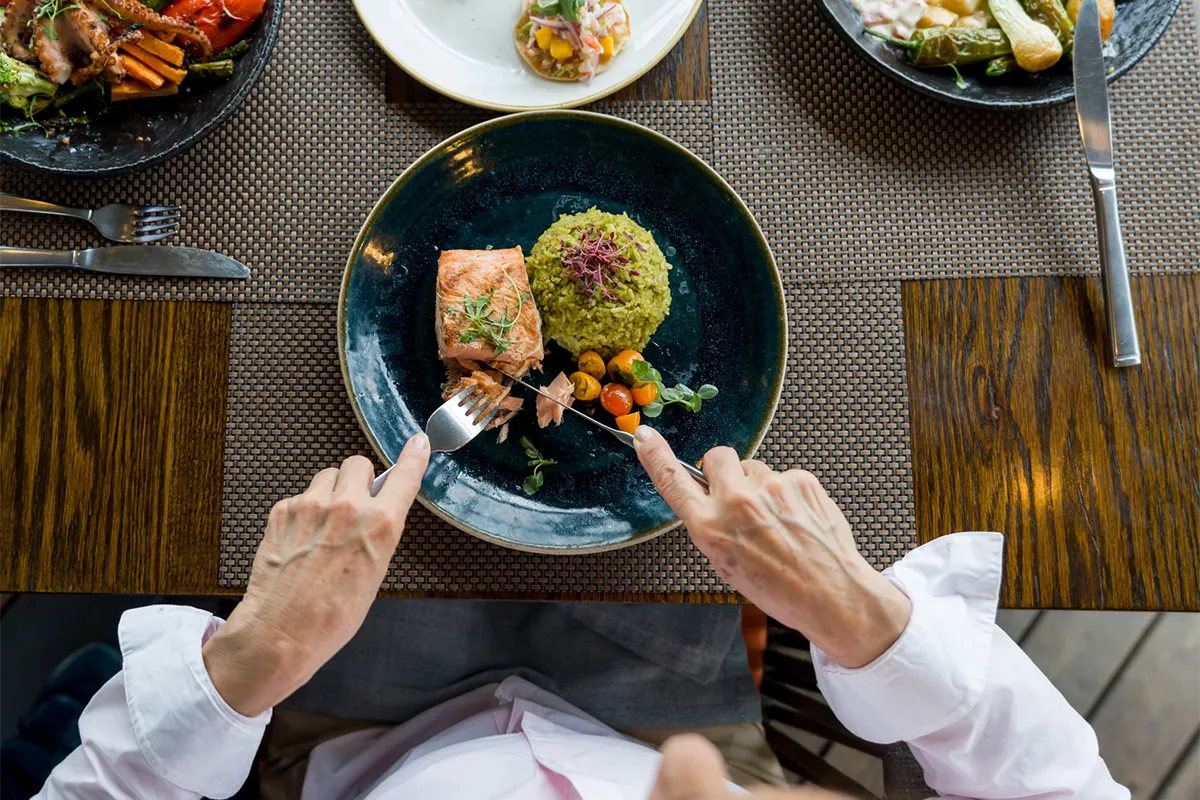
As we age, food becomes more than just fuel. The foods we eat directly affect how we think, how well we remember, and how we feel daily. At Welbrook Memory Care in Santa Monica, we often discuss the connection between food and brain health with families. Brain-healthy foods for seniors aren’t just helpful—they’re essential for supporting memory, focus, and overall cognitive well-being.
Why Nutrition Matters More as We Age
The brain needs proper nutrients to work well. The body processes nutrients differently as we age, and certain vitamin levels may naturally decline. This can affect memory, attention, and even mood. A healthy diet can help slow these changes, reduce inflammation in the brain, and support brain cell communication.
Many researchers now link certain foods with better brain performance and a lower risk of cognitive decline. Diets rich in leafy greens, berries, and omega-3 fats are especially beneficial. These nutrients help the brain fight off stress, stay sharp, and repair itself more efficiently.
For seniors, especially those with memory challenges or early signs of dementia, what’s on the plate matters as much as medication or exercise.
Best Brain-Healthy Foods for Seniors
Here are some of the top foods that support brain health, backed by science and recommended by medical experts:
1. Fatty Fish
Salmon, mackerel, and sardines are packed with omega-3 fatty acids. These fats help build brain cell membranes and reduce mental decline. Seniors who eat fish regularly may show stronger memory and slower age-related brain changes.
2. Leafy Greens
Spinach, kale, and collards are high in vitamin K, folate, and beta-carotene—all nutrients linked to slower cognitive decline. They’re easy to add to soups, smoothies, or stir-fries.
3. Berries
Blueberries, blackberries, and strawberries are rich in antioxidants. These help protect brain cells from damage and may improve memory by supporting healthy blood flow in the brain.
4. Nuts and Seeds
Walnuts are perfect for the brain. They contain healthy fats and vitamin E, which helps slow down brain aging. Flaxseeds and chia seeds also provide fiber and plant-based omega-3s.
5. Whole Grains
Brown rice, oatmeal, and whole wheat bread help keep blood sugar steady. That’s important because the brain runs on a constant supply of glucose. Sudden sugar spikes and crashes can lead to brain fog and mood swings.
6. Turmeric
Curcumin, the active ingredient in turmeric, has anti-inflammatory effects and may help with memory. Adding it to tea, eggs, or rice is an easy way to get the benefits.
7. Eggs
Eggs are a great source of choline, which helps create acetylcholine—a brain chemical tied to memory and mood regulation.
Brain Healing Foods for Seniors with Memory Concerns
Seniors facing memory loss or living with dementia can still benefit from nutrient-rich foods. The key is to focus on foods that are easy to eat, digest, and gentle on the stomach.
- Avocados provide healthy fats that support nerve health.
- Green tea has L-theanine, which may promote calm alertness.
- Unlike butter or margarine, olive oil supports brain function and may protect memory.
Eating these foods regularly will not reverse memory loss but may help slow its progress and support mental clarity.
While many turn to supplements for brain support, real food remains one of the most effective—and proven—ways to nourish the aging brain. Before investing in expensive pills or powders, consider this guide on why brain health supplements might not be worth the money.
Foods That Are Bad for Brain Health
Just as certain foods support the brain, others can harm it. Seniors should limit:
- Refined sugar and high-sugar drinks: These can cause inflammation and memory lapses.
- Processed snacks and fast food: Often high in trans fats and sodium, these interfere with healthy brain function.
- Too much alcohol: Long-term overuse can shrink brain tissue and hurt memory.
- Artificial sweeteners: Some may disrupt the brain’s chemical balance.
It’s not about eliminating these—it’s about reducing your intake and choosing better options more often.
Simple Ways to Add Brain Foods to Daily Meals
It doesn’t take a complete menu overhaul to eat for brain health. A few small changes can make a big difference:
- Add spinach or berries to breakfast oatmeal
- Swap white bread for whole-grain
- Snack on walnuts instead of chips
- Use olive oil instead of butter
- Try grilled salmon once a week
Caregivers can help by preparing softer versions of these foods for those with chewing or swallowing difficulties. Smoothies, soups, and steamed vegetables are all great ways to include brain-boosting ingredients.
How Welbrook Memory Care Supports Better Brain Nutrition
At Welbrook Memory Care in Santa Monica, we take nutrition seriously. Our culinary team works closely with healthcare professionals to craft enjoyable and designed meals to support brain function.
Every plate is tailored to each resident’s dietary needs, personal tastes, and medical considerations. We emphasize foods that help promote memory, clarity, and overall wellness. Fresh, whole ingredients, omega-3-rich options, and antioxidant-packed produce are regular staples on our menus.
Our approach is rooted in Compassionate Cuisine—a thoughtful dining program that prioritizes flavor, dignity, and cognitive support. This philosophy ensures that food nourishes the body and supports emotional and neurological health.
Small Steps Toward a Sharper Mind
No single food is a cure for memory problems. But together, the right choices can support clearer thinking, better focus, and a higher quality of life.
Brain-healthy foods for seniors aren’t trendy—they’re essential and don’t need to be complicated. At Welbrook Santa Monica, we use simple, nutritious meals as one of our tools to support memory and health. We’re happy to talk if you’re concerned about how diet might affect your loved one’s thinking or focus.
FAQs
- What are the best brain-healthy foods for seniors?
Fatty fish, leafy greens, berries, whole grains, nuts, and eggs are some of the most effective brain foods.
- What foods are bad for your brain and memory?
Highly processed foods, refined sugar, too much sodium, and trans fats may harm brain function.
- Can food help seniors with dementia?
Yes, nutrient-rich diets may help slow cognitive decline and support better brain function in those with memory issues.
- How often should seniors eat brain foods?
Daily intake is best. Even small amounts of brain-boosting foods can help when included regularly.
- Are there easy recipes using brain foods?
Yes. Smoothies with spinach and berries, salmon salads, or oatmeal with flaxseeds are all simple and brain-friendly.

